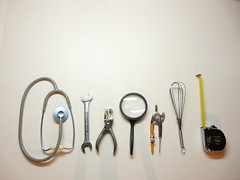The Cutting Edge of Medical Technology Content, Community & Collaboration

Image by Emily Barney via Flickr
Recently read the Latest edition of Journal of Health informatics in developing countries. Specifically, Search engines : a study of nine search engines in four categories by Dallas Knight (Health Informatics Programme University of Otago, Dunedin, New Zealand). This study’s objective was to determine how search engines within different categories compare, and to look at features and trends of search engines that are commonly used for queries by both health consumers and professionals.
The query terms used for this study are
* Ulcerative colitis
* Benign positional vertigo
* Pleomorphic rhabdomyosarcoma
* “online tool” for help with depression
* exercise after bowel cancer operatione
Search engines within the general category (Google, SearchYahoo!) performed best overall.
Meta search engines (Dogpile, Jux2) also performed well with vertical search engines (Healia, Kosmix, Healthline) next. Health portals (Revolution Health, WebMD) produced relevant useful results for common terms, but not for unusual query terms.
This poll on linkedin attempts to quantify "What biomedical search engine do you use?"
Other important medical education and learning tools the study talks about include
* Custom built Search engines (eg Google, Rollyo and EureksterSwiki )
* Blog sites, wikis and podcasts
* social bookmarking with Del.icio.us and Digg.com
* RSS site feeds read by aggregators or emails
* Yahoo Pipes! for channelizing information
The few services and tools it missed include,
* Zotero firefox extension and Evernote web clipper - for online research notes
* Ning for community building
* Youtube(eg.youtube.com/medicaleducation) and Medicalvideos.us for videos.
* Twitter for sharing updates
* Docstoc and Scribd for document search
* Freemind for brain mapping
Check out digital-medicine.blogspot.com for more.
The query terms used for this study are
* Ulcerative colitis
* Benign positional vertigo
* Pleomorphic rhabdomyosarcoma
* “online tool” for help with depression
* exercise after bowel cancer operatione
Search engines within the general category (Google, SearchYahoo!) performed best overall.
Meta search engines (Dogpile, Jux2) also performed well with vertical search engines (Healia, Kosmix, Healthline) next. Health portals (Revolution Health, WebMD) produced relevant useful results for common terms, but not for unusual query terms.
This poll on linkedin attempts to quantify "What biomedical search engine do you use?"
Other important medical education and learning tools the study talks about include
* Custom built Search engines (eg Google, Rollyo and EureksterSwiki )
* Blog sites, wikis and podcasts
* social bookmarking with Del.icio.us and Digg.com
* RSS site feeds read by aggregators or emails
* Yahoo Pipes! for channelizing information
The few services and tools it missed include,
* Zotero firefox extension and Evernote web clipper - for online research notes
* Ning for community building
* Youtube(eg.youtube.com/medicaleducation) and Medicalvideos.us for videos.
* Twitter for sharing updates
* Docstoc and Scribd for document search
* Freemind for brain mapping
Check out digital-medicine.blogspot.com for more.
Views: 177
Comment
© 2025 Created by CC-Conrad Clyburn-MedForeSight.
Powered by
![]()
You need to be a member of MedTech I.Q. to add comments!
Join MedTech I.Q.